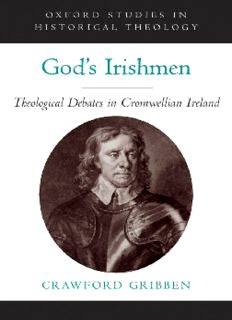
God's Irishmen: Theological Debates in Cromwellian Ireland (Oxford Studies in Historical Theology) PDF
Preview God's Irishmen: Theological Debates in Cromwellian Ireland (Oxford Studies in Historical Theology)
God’s Irishmen OXFORDSTUDIESINHISTORICAL THEOLOGY SeriesEditor DavidC.Steinmetz,DukeUniversity EditorialBoard IrenaBackus,Universite´ deGene`ve RobertC.Gregg,StanfordUniversity GeorgeM.Marsden,UniversityofNotreDame WayneA.Meeks,YaleUniversity GerhardSauter,RheinischeFriedrich-Wilhelms-Universita¨tBonn SusanE.Schreiner,UniversityofChicago JohnVanEngen,UniversityofNotreDame GeoffreyWainwright,DukeUniversity RobertL.Wilken,UniversityofVirginia THECONFESSIONALIZATIONOF AFTERCALVIN HUMANISMINREFORMATION StudiesintheDevelopmentof GERMANY aTheologicalTradition ErikaRummell RichardA.Muller THEPLEASUREOFDISCERNMENT THEPOVERTYOFRICHES MargueritedeNavarreasTheologian St.FrancisofAssisiReconsidered CarolThysell KennethBaxterWolf REFORMATIONREADINGSOF REFORMINGMARY THEAPOCALYPSE ChangingImagesoftheVirginMaryin Geneva,Zurich,andWittenberg LutheranSermonsoftheSixteenthCentury IrenaBackus BethKreitzer WRITINGTHEWRONGS TEACHINGTHEREFORMATION WomenoftheOldTestamentamongBiblical MinistersandTheirMessageinBasel, CommentatorsfromPhilothrough 1529–1629 theReformation AmyNelsonBurnett JohnL.Thompson GREGORYOFNAZIANZUSON THEHUNGRYAREDYING THETRINITYANDTHEKNOWLEDGE BeggarsandBishopsinRomanCappadocia OFGOD SusanR.Holman InYourLightWeSeeLight GregoryA.Beeley RESCUEFORTHEDEAD ThePosthumousSalvationof GOD’SIRISHMEN Non-ChristiansinEarlyChristianity TheologicalDebatesinCromwellianIreland JeffreyA.Trumbower CrawfordGribben God’s Irishmen Theological Debates in Cromwellian Ireland crawford gribben 1 2007 3 OxfordUniversityPress,Inc.,publishesworksthatfurther OxfordUniversity’sobjectiveofexcellence inresearch,scholarship,andeducation. Oxford NewYork Auckland CapeTown DaresSalaam HongKong Karachi KualaLumpur Madrid Melbourne MexicoCity Nairobi NewDelhi Shanghai Taipei Toronto Withofficesin Argentina Austria Brazil Chile CzechRepublic France Greece Guatemala Hungary Italy Japan Poland Portugal Singapore SouthKorea Switzerland Thailand Turkey Ukraine Vietnam Copyright#2007byOxfordUniversityPress,Inc. PublishedbyOxfordUniversityPress,Inc. 198MadisonAvenue,NewYork,NewYork10016 www.oup.com OxfordisaregisteredtrademarkofOxfordUniversityPress Allrightsreserved.Nopartofthispublicationmaybereproduced, storedinaretrievalsystem,ortransmitted,inanyformorbyanymeans, electronic,mechanical,photocopying,recording,orotherwise, withoutthepriorpermissionofOxfordUniversityPress. LibraryofCongressCataloging-in-PublicationData Gribben,Crawford. God’sIrishmen:theologicaldebatesinCromwellianIreland/ CrawfordGribben. p. cm.—(Oxfordstudiesinhistoricaltheology) Includesbibliographicalreferences. ISBN978-0-19-532531-7 1. Protestantchurches—Ireland—History—17thcentury. 2. Churchcontroversies—Ireland—History—17thcentury. 3. Dissenters,Religious—Ireland—History—17thcentury. 4. Ireland—Churchhistory—17thcentury. I. Title. BX4839.G752007 280'.40941509032—dc22 2006038508 9 8 7 6 5 4 3 2 1 PrintedintheUnitedStatesofAmerica onacid-freepaper For Rowena This page intentionally left blank Preface ThisbookmarksareturntoatheologicalenvironmentIfirstdescribed inThepuritan millennium: Literature and theology, 1550–1682.The worldofJohn Rogers—radical preacher, republican, and emerging FifthMonarchist—hasbeen an intriguingbackground to anumber of projects I have completed since my work onthe seventeenth cen- tury began.1 Rogershas attractedother writers, though they tend not to discusshis importance in the context of Cromwellian Ireland. This book is therefore an attemptto contextualize some of the con- clusionsthathavebeenofferedbycolleaguesinliterarystudies,whose interest in Rogers’s conversion narratives hasnot always been sensi- tive to the wider theological debates ofthe period, andto challenge some ofthe conclusions of historians, who have explored that con- text but tend sometimes to downplay the intensely fissiparous envi- ronment of the cultures ofCromwellianIreland.2With allother scholars of the period,I record my debtto indispensable work by Toby Barnard, not least his seminal CromwellianIreland (1975),and totwooldertextswhosecontributiongoesfarbeyondtheaccessthey provide to documents destroyed in 1922: Robert Dunlop’s Ireland under the Commonwealth (1913) andSt.John D. Seymour’s The Puri- tans in Ireland, 1647–1661(1921). Unless otherwise noted, alltexts listedin the bibliography have been published in London. Mostoftheresearchforthisbookwascarriedoutduring myappointmentasresearchfellowintheCentreforIrish-Scottish Studies, Trinity College, Dublin. My four years in the Centre were viii preface formative, and my writing benefited immensely from the atmosphere of in- tellectual curiosity and generosity I shared with such colleagues as Michael Brown, David Dickson, Jane Ohlmeyer, and Ian Campbell Ross. The project also profited from my discussions with other colleagues in Dublin,including Robert Armstrong, Elizabethanne Boran, Raymond Gillespie, Sandra Hynes, Amanda Piesse, and, more recently, Mark Sweetnam. In Belfast, Stephen Gregory, librarian of Union Theological College, and James Davison, libra- rianoftheIrishBaptistCollege,providedaccesstorarevolumes,aswellasother opportunities for the gathering of ideas. Since moving to the University of Manchester, I have been particularly grateful for the support of a coterie of scholarsofthemid-seventeenthcentury,particularlyNaomiBakerandJerome de Groot, and have also gained immense help from conversations with Joe Bergin,JeremyGregory,JohnMcAuliffe,JackiePearson,andMurrayPittock. In the wider scholarly community, I am particularly grateful for advice pro- vided by Toby Barnard, Sylvia Brown, Ian Clary, John Coffey, Tim Cooper, David Farr, Alan Ford, Andrew Holmes, Kathleen Lynch, Simon Meeds, GarnetMilne,MikeRenihan,andDavidShedden.Somematerialsinchapters 2and3appearedpreviouslyinChurchHistoryandinthevolumeConvertsand conversion in Ireland, 1650–1850 (2005), and I am grateful to the editors of thesepublicationsfortheirpermissiontoreusethismaterial.WillyMaley,just before he took to the stage to deliver the University of Manchester’s John Stachniewski Memorial Lecture in April 2006, suggested the title for this book, which pays homage to definitive work by Christopher Hill, in God’s Englishman: Oliver Cromwell and the English revolution, and Hilary Hinds, in God’s Englishwomen: Seventeenth-century radical sectarian writing and feminist criticism. God’s Irishmen shares many of the interests of these colleagues and friends. I alone, of course, should be held responsible for the errors that will inevitably remain. In many ways this book is the product of a digital revolution. Both the University of Manchester and Trinity College, Dublin, provided access to the Early English Books Online (EEBO) database, without which a range of ma- terials of the 1650s could not easily have been collected. Though EEBO is a necessary resource, it is not sufficient, and this project could not have been completed without the additional assistance of staff at the Public Record Of- fice of Northern Ireland, Belfast; the Special Collections unit at Queen’s University of Belfast; the National Library of Ireland, Dublin; Trinity College Library, Dublin; Archbishop Narcissus Marsh’s Library, Dublin; the John Ry- lands University Library, Manchester; Chetham’s Library, Manchester; the li- braryofWestminsterCollege,Cambridge;theUniversityLibrary,Cambridge; preface ix the Bodleian Library, Oxford; and the British Library, London. I record my debt to Cynthia Read, my editor at Oxford University Press, who has pa- tiently supported this project at every stage of its development. Most of all, I record my gratitude to my mother and father, to Pauline and to Daniel. Moladh go deo leis.
Description: